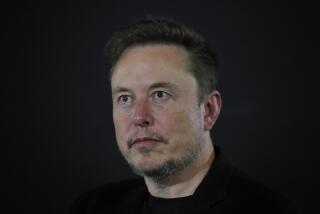German President Visits Israel, Seeks Forgiveness
- Share via
JERUSALEM — In an address as significant for the language in which it was uttered as for its conciliatory tone, German President Johannes Rau on Wednesday asked Israel’s parliament to forgive his nation for the Holocaust and pledged to fight a resurgence of anti-Semitism and far-right extremism in Europe.
Rau’s speech, the first ever delivered to Israel’s Knesset in German, was greeted politely by lawmakers, many of whom praised his efforts to strengthen the sturdy ties between Israel and Germany and to express public responsibility for his nation’s Nazi past.
But several legislators boycotted the session, with one, Likud Party lawmaker Danny Naveh, calling it “premature” to allow such an address to a body that still includes Holocaust survivors.
Other Israelis, including Knesset Speaker Avraham Burg, admitted to feeling some discomfort at listening to German in an official address before parliament. Burg, whose father fled Berlin in 1939, said he had deliberated long and hard before allowing the speech but did so after reflecting that German was the language not only of the Nazis but of “philosophy and sublime poetry.”
“It’s the language of the murderers and the language of the murdered,” Burg said. “I decided that today this double language will be heard here because it isn’t the language that is the main thing, but the speaker and his words.”
Rau has served as German president, a largely ceremonial role, since July. Considered a longtime friend of the Jewish state, he has visited Israel many times and chose to return to the country in his first official visit abroad.
He opened his speech with an emotional apology for the Holocaust, the genocide of 6 million Jews by the Nazis during World War II.
“With the people of Israel watching, I bow in humility before those murdered, before those who don’t have graves where I could ask them for forgiveness,” said the 69-year-old Rau. He said he sought Israel’s pardon for himself and his generation in order to enable coming generations of Germans and Israelis to forge a future together.
Introducing Rau as an “old friend” of Israel, Prime Minister Ehud Barak acknowledged that it isn’t easy to overcome the two nations’ shared, traumatic history.
“But if in the year 2000 the German president can be accepted by the Knesset of Israel as an old friend and an ally, there are no difficulties and obstacles that can withstand worthy intentions,” Barak said. In September, underscoring the increasingly close relationship between the two countries, Barak became the first foreign leader to visit Berlin after the city was restored as the capital of a united Germany.
But Rau’s speech and Israeli leaders’ reactions to it also served to underline Israeli and European disapproval of the participation of a far-right party in the government of Austria, Germany’s neighbor.
Rau referred only indirectly to Austrian far-right leader Joerg Haider, promising that half a century after the Holocaust, Europe would never allow racism and xenophobia to grow in its soil again. Israel recently recalled its ambassador to Austria in protest after Haider’s Freedom Party became a member of the governing coalition.
In his speech, Barak praised Germany for its leadership role in the European Union’s decision to take steps to isolate what Barak called Austria’s “coalition of shame.” Unlike Austria, the Israeli leader said, Germany has confronted its past and tried to ensure that extremist groups cannot rise to power again.
More to Read
Sign up for Essential California
The most important California stories and recommendations in your inbox every morning.
You may occasionally receive promotional content from the Los Angeles Times.










